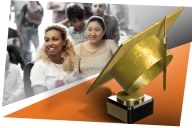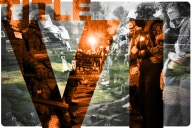You have /5 articles left.
Sign up for a free account or log in.
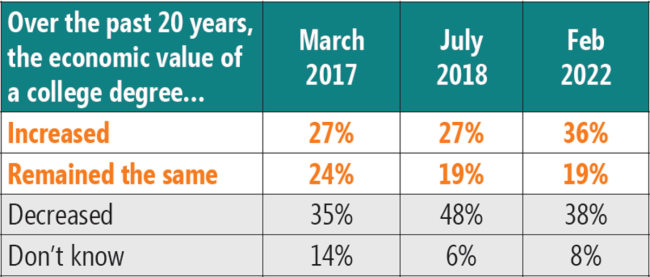
Winston poll for American Council on Education
Public confidence in higher education ebbed badly in the latter half of the last decade, to judge by the steady stream of opinion polls from 2017 through 2019 that showed Americans (especially Republicans) increasingly convinced that colleges and universities were heading in the wrong direction, failing to prepare graduates for work and favoring liberal views over conservative ones.
Those attitudes, combined with growing scrutiny from Republican politicians in numerous states on campus curricular and governance matters, spurred nearly eight in 10 respondents to Inside Higher Ed’s recent Survey of College and University Presidents to agree that they were “worried about Republicans’ increasing skepticism about higher education” and that “the perception of colleges as places that are intolerant of conserving views is having a major negative impact on attitudes about higher education.”
Public opinion polling about higher education appeared to drop off during the COVID-19 pandemic, so there’s been little way of gauging whether Americans’ impressions of colleges and universities have continued to erode or begun to turn around. A new survey of 1,000 registered voters by the Winston Group, conducted for the American Council on Education and shared with attendees at its annual meeting last week, provides an initial answer to that question.
Advocates for higher education will find the results relatively heartening—especially if their baseline is the pre-pandemic levels to which historic support for higher ed had fallen (since the current numbers are hardly ideal).
Twice as many Americans (38 percent) said they believed higher education was “generally on the right track” as thought it was on the wrong track (19 percent), with a plurality (44 percent) saying they didn’t know. That’s comparable to how respondents answered the same question in 2019 and somewhat better than the responses in 2017, when 27 percent of Americans said they thought higher ed was on the wrong track. All of those surveys were conducted by the Winston Group for ACE.
Officials at ACE, the biggest and broadest association of college officials and the industry’s chief lobbying group, were motivated to survey the public in large part to try to gauge whether the escalating rhetoric questioning the value of going to college was contributing to the enrollment declines colleges and universities collectively have suffered in the last few years.
If this one survey is indicative, the answer appears to be no. More than a third of respondents—36 percent—said they believed the economic value of a college degree had increased over the last 20 years, while 38 percent said it had decreased and 19 percent said it had remained the same. That’s a marked change from 2018, when 27 percent of respondents said the value had increased and 48 percent said it had decreased.
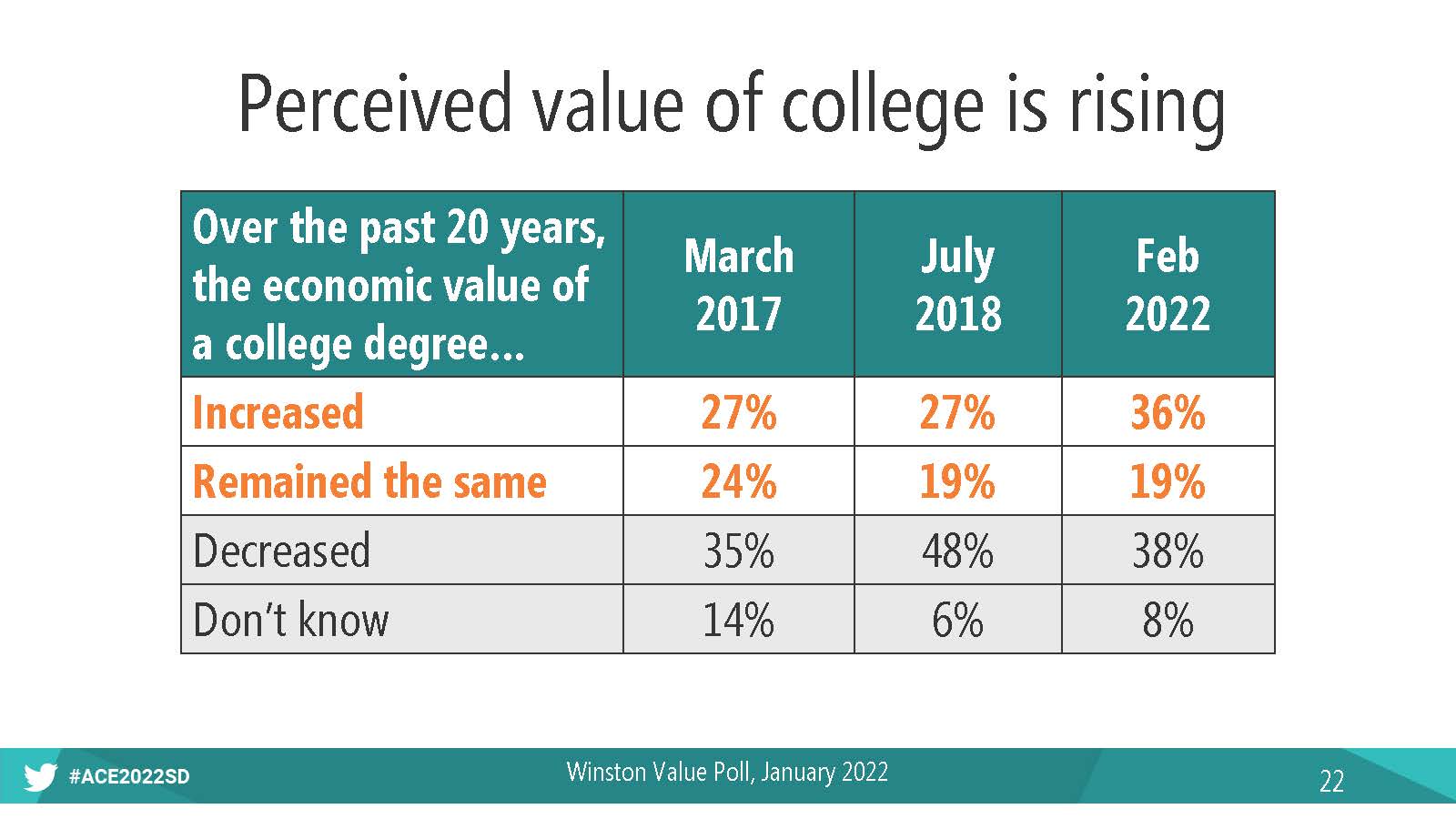
The poll results also suggest that the public is less supportive than it used to be of another emergent critique: that colleges and universities are turning out graduates who are unprepared for today’s economy.
As with the responses about economic value, campus leaders are unlikely to jump up and down with glee over this finding: Americans are evenly divided when asked if they believe most graduates are ready for the workforce, with 44 percent agreeing and 45 percent disagreeing. But asked a similar question in July 2018, 34 percent of Americans said they believed graduates were workforce ready, and 53 percent disagreed. (A year earlier, in March 2017, 49 percent answered positively and just 34 percent answered negatively.)
The last question the poll explored was about the political environment on campuses, which has gained ever more attention amid state legislative action restricting the teaching of critical race theory and other purportedly “divisive” topics.
In July 2018, only 28 percent of Americans agreed when asked to respond to the statement “Liberal and conservative views are equally respected on campus,” and 51 percent disagreed. When Winston Group surveyed them for ACE this February, 41 percent agreed and 40 percent disagreed.
The Partisan Divide
What’s the opposite of a silver lining? Whatever that is, a big one exists on the answers to all of these questions, and that is the growing political divide in the U.S. In all these cases, significant differences exist between Republicans and Democrats—and increasingly Independents.
That’s hardly surprising on the question about the campus environment for political views, and the parties do not disappoint, as seen below. Democrats agree that liberal and conservative views are equally respected by about the same ratio that Republicans disagree, with Independents in between but slightly more in alignment with Republicans.
Roughly the same divide arises on the question of whether higher education is on the right track, with 55 percent of Democrats agreeing that it is (28 percent disagree) while 25 percent of Republicans agree and 58 percent disagree. Independents are again in the middle, with 31 percent agreeing and 48 percent disagreeing.
The “economic value” question referenced above produced perhaps the most surprising result in the entire survey. The partisan divide appears as elsewhere in the survey, with Democrats almost twice as likely to say a degree has increased in value over 20 years as to say it has decreased, and Republicans slightly more likely to say it has decreased.
But on this question, Independents take the most negative view, with twice as many saying the degree has declined in value (50 percent versus 25 percent saying it has gained).
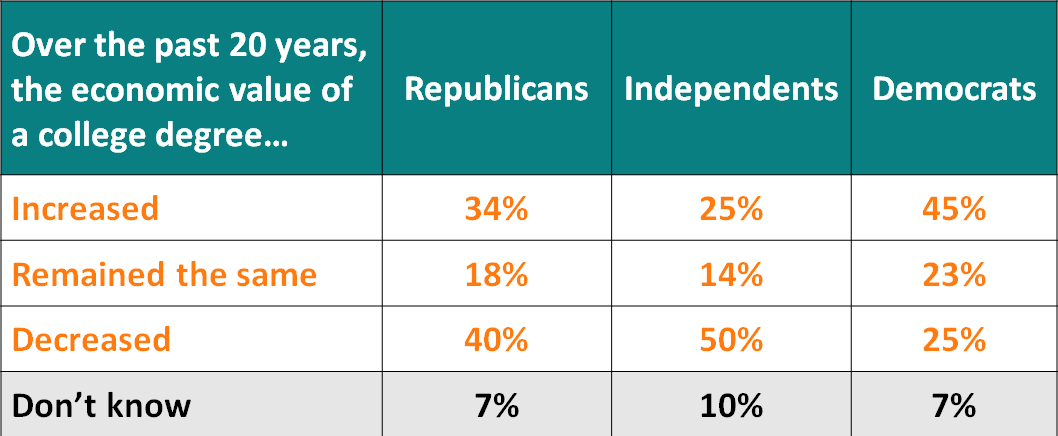
What to Make of the Results
Several analysts who reviewed the results of the American Council on Education’s survey said they thought the results were heartening for higher education, especially given public opinion results generally showing Americans to be dissatisfied with many aspects of society. (Another question in the ACE survey found just 17 percent of respondents were satisfied with the direction the country is headed in.)
“People are really cranky in general, so it’s hard not to view these results as being pretty favorable for higher ed,” said Lanae Erickson, senior vice president for social policy, education and politics at Third Way, a center-left think tank in Washington, D.C., that has done its own polling about higher education.
She said she was particularly struck that “only” half of Republicans “think both sides are not respected in higher education, given that 70 percent of Republican voters don’t believe the election results were real.”
Will Doyle, a professor of public policy and higher education at Vanderbilt University, has tracked public polling on higher education for nearly 25 years. The data reinforced for him “the overall level of stability in the way the public views higher education,” Doyle said.
“What’s actually important about colleges and universities is that they’re the primary places you can go to get a good job,” he said. That’s important, because another question in the ACE survey found roughly half of Americans saying the primary reason to go to college is to “prepare for a job”—a consistent finding over the five years of ACE’s surveys, and going back further as well, Doyle noted.
Doyle said the poll’s evidence of continued polarization of the political parties in their views about higher education remains concerning. But while prominent conservatives continue to take shots at colleges and academics rhetorically and with restrictive bills, both Republican- and Democratic-led legislatures continue to support higher education financially, he said. “Even if they’re unhappy about some things, they continue to realize their states need a well-educated group of people to be competitive.”







